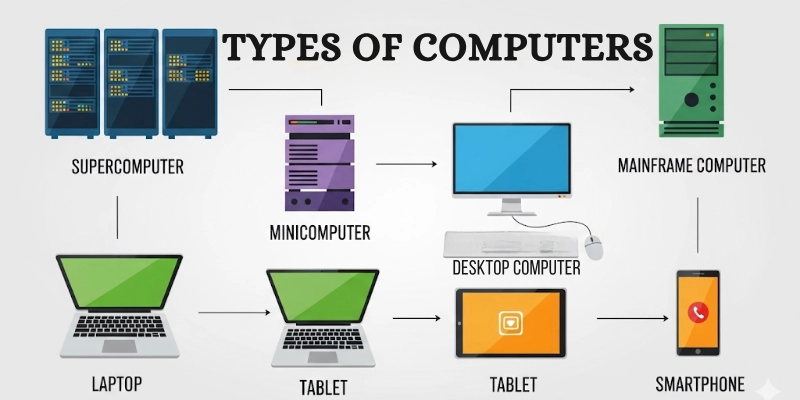Types of Computers Explained: A Simple Guide for Beginners
Published: 15 Sep 2025
Computers are everywhere, but not all computers are the same. These different types of computers are designed for different jobs.
Knowing the types of computers is important because each kind has a unique role. The classification of computers helps us see how computer types are used in real life.

In this article, we will explain the main kinds of computers with simple computer examples.
What are Computers?
A computer is an electronic machine that takes data, processes it, and gives useful information. In simple words, a computer is a smart device that helps us solve problems, store information, and perform tasks faster.
To understand technology better, we use computer classification. Computers can be grouped based on their size, purpose, and function. This makes it easier for beginners to learn what computer basics are and see how different machines are used in daily life.
Types of Computers Based on Size and Power
Computers can be grouped by size and power, ranging from huge supercomputers to small personal devices. Each type, whether supercomputer, mainframe, minicomputer, or microcomputer, is designed for different levels of work and usage.
Here are some types of computers.
- Supercomputer
- Mainframe Computer
- Mini Computer
- Micro Computer
Let’s discuss them in detail.
Supercomputer
A supercomputer is the most powerful type of computer. It can process a huge amount of data at a very high speed. These machines are much faster than normal computer types and are mainly used for very complex tasks.
Uses: Supercomputers are used for weather forecasting, space research, scientific simulations, and handling big data.
Example: Famous supercomputers include Fugaku in Japan and Summit in the USA.
Mainframe Computer
A mainframe computer is a large and powerful system used by big organizations. Unlike personal computer types, it can handle thousands of users at the same time without slowing down.
Uses: Mainframes are mainly used in banks, insurance companies, government offices, and airlines for managing huge amounts of data.
Example: Popular examples include IBM mainframes, which are trusted worldwide for business and security.
Minicomputer (Mid-Range Computer)
A minicomputer is smaller than a mainframe computer but still powerful enough to handle many tasks. These computer types are often used when organizations need good performance without the high cost of a mainframe.
Uses: Minicomputers are used by small companies, factories, and industries for tasks like managing production, databases, and business operations.
Example: A well-known example is the PDP series, which was popular in earlier computer generations.
Microcomputer (Personal Computer)
A microcomputer is the most common type of computer by size that we use every day at home, school, or the office. It is smaller and cheaper compared to a supercomputer or a mainframe computer, but perfect for personal tasks.
Uses: Microcomputers are used for studying, browsing the internet, playing games, creating documents, and communicating.
Examples: Popular microcomputers include desktops, laptops, tablets, and smartphones.
Types of Computers Based on Purpose
Computers can also be grouped by purpose, where some are general-purpose machines used for everyday tasks, while others are special-purpose computers built for a single job. This classification helps us understand how different kinds of computers serve unique needs in daily life.
Here are two types of computers based on purpose.
- General-Purpose Computers
- Special-Purpose Computers
Let’s talk about them in detail.
General-Purpose Computers
A general-purpose computer is designed to perform everyday tasks. These computer types are flexible and can run many kinds of software for work, study, or entertainment.
Uses: People use them for writing documents, browsing the internet, watching videos, making presentations, and playing games.
Examples: The most common general-purpose computers are PCs and laptops.
Special-Purpose Computers
A special-purpose computer is built to do one specific job. Unlike general-purpose computers, these machines cannot perform many different tasks. They are designed to be simple, fast, and reliable for their set function.
Uses: Common uses of computer types like this include controlling ATMs, washing machines, traffic lights, and medical devices.
Examples: Everyday examples of special-purpose computers are the systems inside ATMs, washing machine controllers, and traffic lights.
Types of Computers Based on Data Handling
Based on data handling, computers are divided into analog, digital, and hybrid types. This classification shows how machines process information, through continuous signals, binary numbers, or a mix of both.
Here are three types of computers based on computer handling.
- Analog Computer
- Digital Computer
- Hybrid Computer
Let’s look at them in detail.
Analog Computer
An analog computer works with continuous data, such as temperature, pressure, or speed. Instead of using numbers, it represents information in physical quantities like waves or signals.
Uses: These computer types were once popular in scientific and engineering fields for solving complex problems. Today, they are rare but still useful in some research areas.
Example: Early flight simulators and devices that measure temperature or speed are examples of analog computers.
Digital Computer
A digital computer works with data in binary form, using 0s and 1s. These machines are very accurate and fast because they process information as numbers and symbols.
Uses: Almost all modern computer types, including desktops, laptops, tablets, and smartphones, are digital computers. They are used for education, business, research, gaming, and communication.
Example: Your PC or laptop is a common example of a digital computer.
Hybrid Computer
A hybrid computer is a mix of an analog computer and a digital computer. It uses the speed of analog systems and the accuracy of digital systems, making it very powerful for special tasks.
Uses: Hybrid computers are widely used in hospitals for heart rate monitors, in research labs, and in scientific experiments.
Example: Machines that track patient health or perform complex simulations are examples of hybrid computers.
Types of Microcomputers
Since microcomputers are the most common type of computer by size, let’s look at their main categories:
- Desktop Computer
A desktop computer is a stationary machine usually kept on a desk. It is powerful, reliable, and often used in homes, schools, and offices for work, study, and entertainment. - Laptop / Notebook
A laptop computer (also called a notebook) is portable and runs on a rechargeable battery. People use laptops for studying, business, travel, and personal use because they are easy to carry anywhere. - Tablet
A tablet is a slim device with a touchscreen instead of a keyboard. It is smaller than a laptop computer but bigger than a smartphone, making it useful for reading, watching videos, and light work. - Smartphone
A smartphone is the smallest and most popular microcomputer today. It is carried in the pocket and used for calling, messaging, browsing, apps, and social media. - Workstation
A workstation is a high-performance PC designed for technical or scientific tasks. Unlike a regular desktop computer, it has more power and is used by engineers, designers, and researchers.
Different Types of Computers
The following computer comparison shows the main types of computers with examples and their common uses.
| Type of Computer | Features | Example | Common Uses |
| Supercomputer | Most powerful, very fast, handles massive data | Fugaku, Summit | Weather forecasting, space research, and big data analysis |
| Mainframe Computer | Large, supports thousands of users at once | IBM Mainframe | Banking, airlines, government records |
| Minicomputer | Smaller than a mainframe, mid-range power | PDP Series | Small industries, factories, and database management |
| Microcomputer | Small, affordable, personal use | Desktop, Laptop, Tablet, Smartphone | Study, business, gaming, and communication |
| General-Purpose Computer | Flexible, runs many programs | PCs, Laptops | Internet, documents, presentations, and entertainment |
| Special-Purpose Computer | Built for one task only | ATM, Traffic Light System | Banking, appliances, control systems |
| Analog Computer | Works with continuous data | Thermometer systems | Scientific calculations, measuring speed/temperature |
| Digital Computer | Works with binary (0s & 1s) | PCs, Smartphones | Education, business, research, and gaming |
| Hybrid Computer | Mix of analog + digital | Heart rate monitor | Hospitals, research labs, simulations |
| Workstation | High-performance PC | Dell Precision, HP Z Series | Engineering, design, research |
Conclusion
In this article, we learned that computers are classified based on their size, purpose, and function. This simple computer classification helps us understand how each machine works and why it is important.
Each type of computer has a unique role in our daily lives. From the powerful supercomputers that predict weather to the smartphones we carry every day, all types of computers are designed to make life easier and smarter.
So, whether it’s for learning, business, science, or entertainment, every computer type is shaping the world in its own way.
FAQs
Here are some frequently asked questions about kinds of computers.
The 4 main kinds of computers are supercomputers, mainframe computers, minicomputers, and microcomputers. These are classified mainly by size and power.
A supercomputer is designed for very fast calculations like weather forecasting or space research, while a mainframe computer is built to handle thousands of users and large databases at once.
For home use, a microcomputer such as a desktop or laptop is best. They are affordable, easy to use, and meet everyday needs.
Yes, a smartphone is a small microcomputer. It works like a computer because it processes data, runs apps, and connects to the internet.
General-purpose computers (like PCs and laptops) can perform many tasks, while special-purpose computers (like ATMs and washing machine systems) are made for one specific job.
An analog computer works with continuous data, a digital computer works with binary (0s and 1s), and a hybrid computer combines both features for special tasks like medical monitoring.
The smartphone is the smallest and most popular type of computer today, and it allows people to stay connected, work, and entertain themselves on the go.
Hospitals often use hybrid computers (like heart rate monitors) along with digital computers for patient records and research.
Computer classification is usually done by size, purpose, and data handling method. This makes it easier to explain the kinds of computers in simple steps.
The supercomputer is the most powerful type of computer. It can solve complex problems at extremely high speed.

- Be Respectful
- Stay Relevant
- Stay Positive
- True Feedback
- Encourage Discussion
- Avoid Spamming
- No Fake News
- Don't Copy-Paste
- No Personal Attacks

- Be Respectful
- Stay Relevant
- Stay Positive
- True Feedback
- Encourage Discussion
- Avoid Spamming
- No Fake News
- Don't Copy-Paste
- No Personal Attacks





